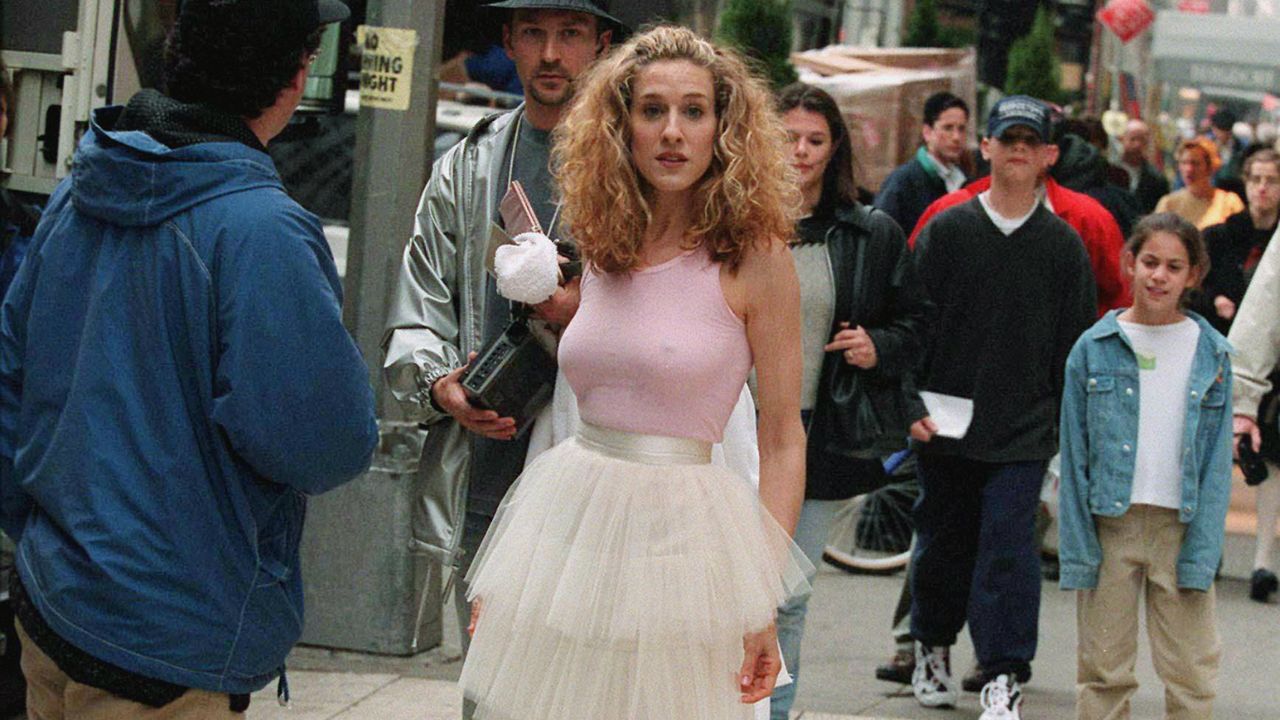Have you got early-onset nostalgia?
If you find playing Pokémon Go, mainlining Craig David and binge-watching Sex And The City intensely comforting, it’s hardly surprising in this uncertain world. But can it go too far? And how can you turn pining for the past into a positive experience?

If you find playing Pokémon Go, mainlining Craig David and binge-watching Sex And The City intensely comforting, it’s hardly surprising in this uncertain world. But can it go too far? And how can you turn pining for the past into a positive experience?

Most of us would admit to being somewhat floored by recent events – Brexit, Trump, a background of doom caused by war and relentless change fuelled by the Internet. Every day there is something new and often frightening to digest. So how are we dealing with it? Well, for therapist Beth McKenzy, 35, the answer has been to take a break from the present day. By the time her wife, Sarah*, comes home from work at 8pm, Beth is invariably wrapped in a blanket, dog-eared JK Rowling in hand. Together, the couple cooks against a soundtrack of Radio 4. Potatoes, carrots, chicken – cosy, safe, familiar foods.
‘I just needed to retreat from the present day for a little while,’ says Beth. ‘Last year threw me off course, and I still feel completely disillusioned with society. I guess I’m in mourning for simpler times.’ Brexit may have been the trigger, she adds, but the US election was the bullet that tore through her faith in humanity. On 10 November, Beth sought solace in a copy of The Famous Five. Now she’s working her way through Harry Potter And The Chamber Of Secrets.
If last year taught Beth (and the rest of us) anything, it’s that a) just when you thought the worst had happened, the world can still surprise you, and b) when it comes to dealing with the consequences of unhappy events, it’s often much easier to look to the past than face the future. Horror at the news of Syria or sadness over David Bowie’s death can be softened, we’ve learned, by Craig David’s comeback and an impending reboot of Disney’s Beauty And The Beast.
How we fell in love with the past Nostalgia’s influence is clear. Less than a month after the EU referendum on 23 June, Pokémon Go was downloaded by 13 per cent of the UK adult population. When blogger Hannah Gale, 27, wrote a listicle entitled, ‘42 Things All Noughties Teenagers Will Remember’ it got over 3 million views (more than twice her average number). Faced with newsfeeds of political crises, global disasters and a sense of impending catastrophe (house sharing at aged 95, anyone?), we’re throwing back to last Thursday in a millennial trend that’s been dubbed ‘early-onset nostalgia’.
‘People typically feel nostalgic when they experience disruption or setbacks,’ explains Dr R Tim Wildschut, associate professor of psychology at the University of Southampton. Perhaps this is why so many people voted for Brexit, and Trump’s continued rhetoric about taking his country back to the simpler times before large-scale globalisation resonated with millions. Maybe it tapped into our sense that things were somehow better in the past.
‘Nostalgia is an emotion that affects every generation,’ confirms Dr Wildschut. ‘But young people are particularly susceptible to it now, because socially we’re going through a period of huge political and economic change that they’ve probably never experienced before.’ Still, he’s not concerned – while historically nostalgia was seen as a sign of mental illness, research now consistently reaffirms its positive influence. ‘Reminiscing about days gone by has been proven to lower stress levels in times of crisis,’ he adds. ‘One of our studies even revealed that nostalgia can elevate your body temperature during winter.’
Marie Claire Newsletter
Celebrity news, beauty, fashion advice, and fascinating features, delivered straight to your inbox!

A healthy dose of nostalgia can help to action social and political change - just look back at the Made In Dagenham gals
Harness the power of nostalgia So looking back, it seems, isn’t all bad if it’s used to propel us forward. ‘Nostalgia is the one emotion that helps us to transition from a period of fear to one of action,’ says Dr Wildschut. By focusing on better times, you can find the strength to withstand the challenges ahead.’ Yes, your memories are probably rose-tinted, he adds, but accuracy isn’t important. ‘What’s key is that you extract something from the past to help you move on.’
For Bryony Kimmings, a 35-year-old politically-inspired performance artist focused on using creativity as a means of inspiring social change, progression is crucial. ‘I do understand the temptation to reminisce, but if that just means talking about how much better things were a year ago, we’re not achieving anything,’ she says. ‘We need to act on the lessons we’ve learned from the past.’
Get inspired If history has taught us anything, it’s that a politically uncertain future can actually bring greater opportunities to make an impact. It’s an invitation to imagine a bigger and better society, then discover new ways to realise it – be that by joining a political party, participating in a protest or just picking up a paintbrush. ‘Art – theatre, music, fashion and everything in between – is always more powerful when it stems from a struggle,’ adds Bryony. ‘Just look at Sam Cooke’s 1964 anthem for equal rights, A Change Is Gonna Come. When times are tough, it’s always up to artists to decipher and articulate the world’s troubles.’
The post-electoral social media backlash doesn’t have to mean ditching all things digital, though. While Beth has cut back on tweeting, Bryony is keen to point out that technology can still be an incredible catalyst for change – just as long as we stop mistaking Facebook posts for political acts. ‘I feel like the power of video is often being underestimated,’ says Bryony. ‘Online streaming sites such as Netflix can reach some of the most diverse audiences out there and give us access to documentaries way outside the perimeters of our own experiences.’
Producer and social activist Catrin Cooper, 32, feels so strongly about this that she’s already working on producing her own video series of ‘activist Ted Talks’. ‘So much is riding on our response to the current political climate,’ she says. ‘I had to be proactive.’ When I suggest this to Beth, she agrees. ‘I do believe that individuals can make a difference, but sometimes, when life gets a bit much, there are a lot of positive messages to take from Harry Potter. After all, if you can overcome Voldemort, you can overcome anything.’

Harry Potter: everyone's feel-good fix
5 ways to stop living in the past
We asked Alla Davies, psychologist and Harley Street psychotherapist, for her top tips
1. Accept your limits Instead of panicking about the future, take a deep breath and realise that there are some things you can’t change. Otherwise, you’ll feel so overwhelmed that you’ll forget about the smaller issues you do have influence over.
2. Train yourself to think differently Grab a piece of paper and illustrate the world you want to see – and the goals you need to achieve in order to get it. This process allows your brain to begin to think differently.
3. Create a positive social environment We are the people we surround ourselves with – and our social context is our support mechanism. Seek out those who care about the same issues as you. Together, you’ll feel strong and optimistic.
4. Make forward-thinking a habit If you’ve been running away from the present day for a while, regularity is key to successful change. Rather than forcing yourself to talk to new people all the time, start a conversation with a stranger every Monday.
5. Express yourself freely One reason people reminisce about the past is because they believe they were less constrained during their youth. Stop worrying about others’ opinions and do one thing every week that makes you feel good.
-
 5 chic and easy spring outfits I'll be wearing on repeat
5 chic and easy spring outfits I'll be wearing on repeatGetting ready will be a breeze
By Jazzria Harris
-
 I'm a Health Editor and marathon runner who's tested nearly 1000 pairs - my definitive pick of the best running shoes for women
I'm a Health Editor and marathon runner who's tested nearly 1000 pairs - my definitive pick of the best running shoes for womenDon't be confused by the jargon - we've tried 100's of trainers and these are the ones worth investing in.
By Ally Head
-
 This iconic 90’s scent was my first ‘grown-up’ perfume—and the coolest girls I know *still* wear it today
This iconic 90’s scent was my first ‘grown-up’ perfume—and the coolest girls I know *still* wear it todayA true trailblazer of its time
By Rebecca Fearn